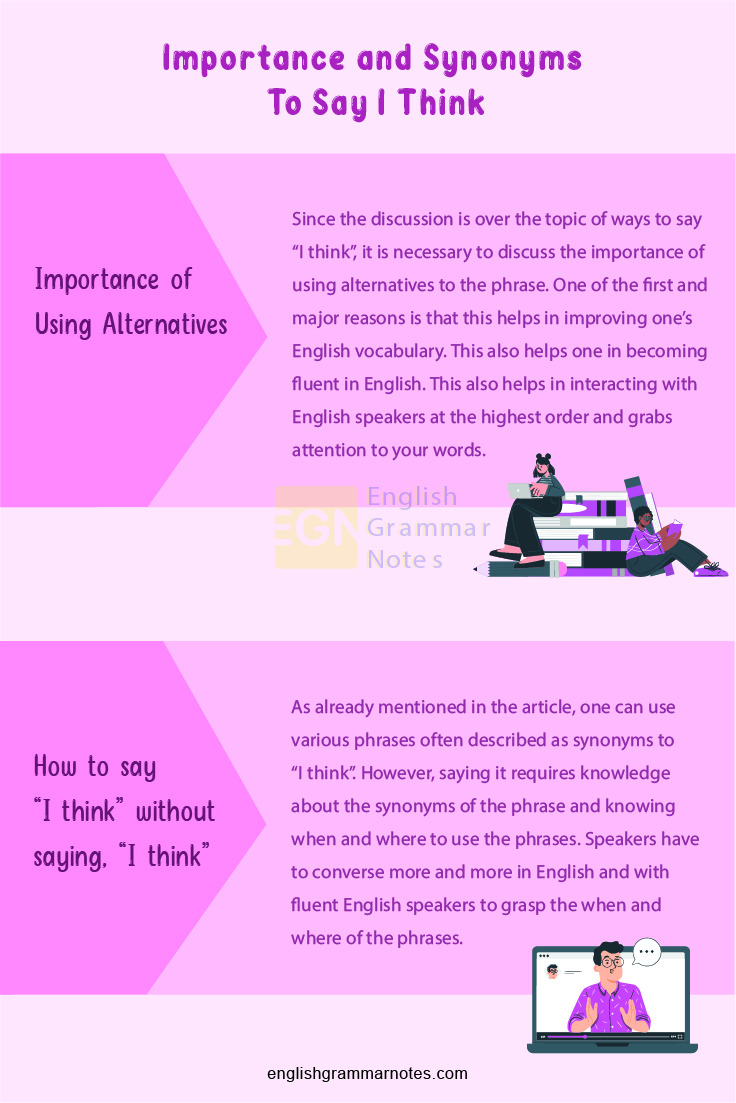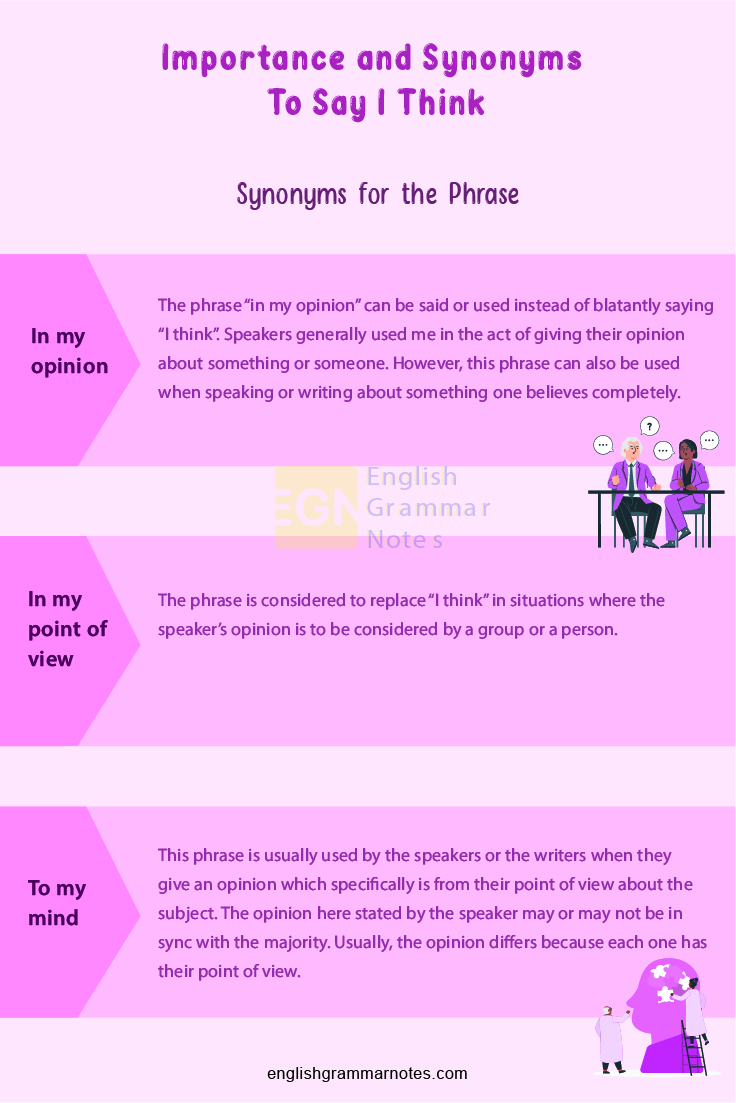Ways to Say I Think: The act of believing something, having an idea or opinion about anybody or anything, is known as thinking. People think before doing anything and everything. They think to reason, and they think to decide; they think to remember. The act of thinking involves immense coordination between the brain and the senses of the body.
In order to make a stronghold on a certain language, one has to be able to converse their ideas and thoughts in the language, and the same goes for English. English speaking people around the world often use the phrase “I think” to address the act of thinking, but there are various other ways of saying “I think” which people completely ignore. Using different synonyms for “I think” instead of the original phrase is something we will discuss in detail in the article.
Here we will go into detailed discussion about the list of synonyms present for the phrase “I think”, the different ways of saying“I think”, why is it important to use alternatives rather than saying “I think”, and also the ways of how to say “I think” without saying “I think”.
Different Ways To Say I Think
- Importance of Using Alternatives
- Synonyms for the Phrase
- How to say “I think” without saying, “I think.”
- Takeaway from this article
Importance of Using Alternatives
Since the discussion is over the topic of ways to say “I think”, it is necessary to discuss the importance of using alternatives to the phrase. One of the first and major reasons is that this helps in improving one’s English vocabulary. This also helps one in becoming fluent in English. This also helps in interacting with English speakers at the highest order and grabs attention to your words.
Using these alternatives in one’s interactions helps them in knowing when to use them properly, as done by the English speakers. For example, the alternatives for “I think” are used widely in debates and arguments. Hence, using these alternatives during daily conversations will help one use them more effectively in debates and arguments. Moreover, using these alternatives during arguments and debates will also help the speaker draw more attention to their words and help them clarify their ideas to the listeners.

Synonyms for the Phrase
The phrase “I think” can be and has been said in different ways by English speakers. But, along with that, these synonyms are grammatically correct. Hence, writers and poets use it to bring out the essence of their ideas and thinking. A list of synonyms are :
In my opinion: The phrase “in my opinion” can be said or used instead of blatantly saying “I think”. Speakers generally used me in the act of giving their opinion about something or someone. However, this phrase can also be used when speaking or writing about something one believes completely.
In my opinion, the Democrats have a better chance of winning the elections this year.
I assume: Another phrase often used as a synonym for “I think”. They are usually being used when the speaker is explaining a situation where the speaker was not present or when the speaker is describing an experience.
I assume he had left his wallet on the table.
In my point of view: The phrase is considered to replace “I think” in situations where the speaker’s opinion is to be considered by a group or a person.
In my point of view, his injury was not well treated.
As far as I can : The phrase is about ones concern and the phrase is often used as a replacement for “I think” when the speaker gives his opinion deep from his insight about someone or something.
As far as I can tell, he left the job five days ago.
To my mind: This phrase is usually used by the speakers or the writers when they give an opinion which specifically is from their point of view about the subject. The opinion here stated by the speaker may or may not be in sync with the majority. Usually, the opinion differs because each one has their point of view.
To my mind, she died because of a cerebral attack.

As far I am concerned: The phrase is used when the speaker addresses something or someone about which or whom the speaker has an opinion based on the speaker’s opinion of the situation himself.
As far I am concerned, my family and the neighbourhood in which they are staying is safe.
The way I see things: The phrase itself is very suggestive about the situations and ways it is used. Generally, when the speaker creates an opinion about something or someone completely based on one’s belief about the situation.
The way I see things is that due to the coronavirus outbreak, many people have lost their jobs, increasing the gap between the rich and the poor.
As I see it: When the speaker has to give an opinion, that depends on the way they are looking into the matter. The phrase is often heard from an individual who is performing the act of investigating something or someone.
“As I see it, this is a murder and not a natural death,” said the cop.
I feel: The phrase mentioned here is used when the speaker’s opinion is generated more from emotions and beliefs than from reasoning.
So many months have passed, yet I feel my brother will return.
How to say “I think” without saying, “I think”
As already mentioned in the article, one can use various phrases often described as synonyms to “I think”. However, saying it requires knowledge about the synonyms of the phrase and knowing when and where to use the phrases. Speakers have to converse more and more in English and with fluent English speakers to grasp the when and where of the phrases. For example, the phrase “I think” is quite blatant and does not quite make the listeners realise the importance of the speaker’s words, whereas using an “I assume” or a “From my point of view” makes the sentence more appealing.
Suppose one had to give an opinion about a hot topic during an argument with a co-worker. In such a situation, if the speaker says, “I think he robbed the bank in the middle of the night”, that would not be of much importance. Still, if the speaker says, “As I see it, the bank robber had happened in the middle of the night”, then that sentence might grab a few eyeballs along with the fact that the speaker’s opinion is far and out clear. Thus, the urge to change the phrase “I think” would increase when that person understands how the use of different phrases affects the impact of a normal sentence.
Takeaway From This Article
The article will help people get a good grasp of the English language, both fluency and cultural and writing. Any person who aspires to be good in debates or wants to be a speaker in the future will surely not finish the article and go empty-handed. Since we have gone into a detailed discussion with the use of very simple and common examples, the article will also be helpful for someone who is just taking their baby steps in learning to speak and write English.